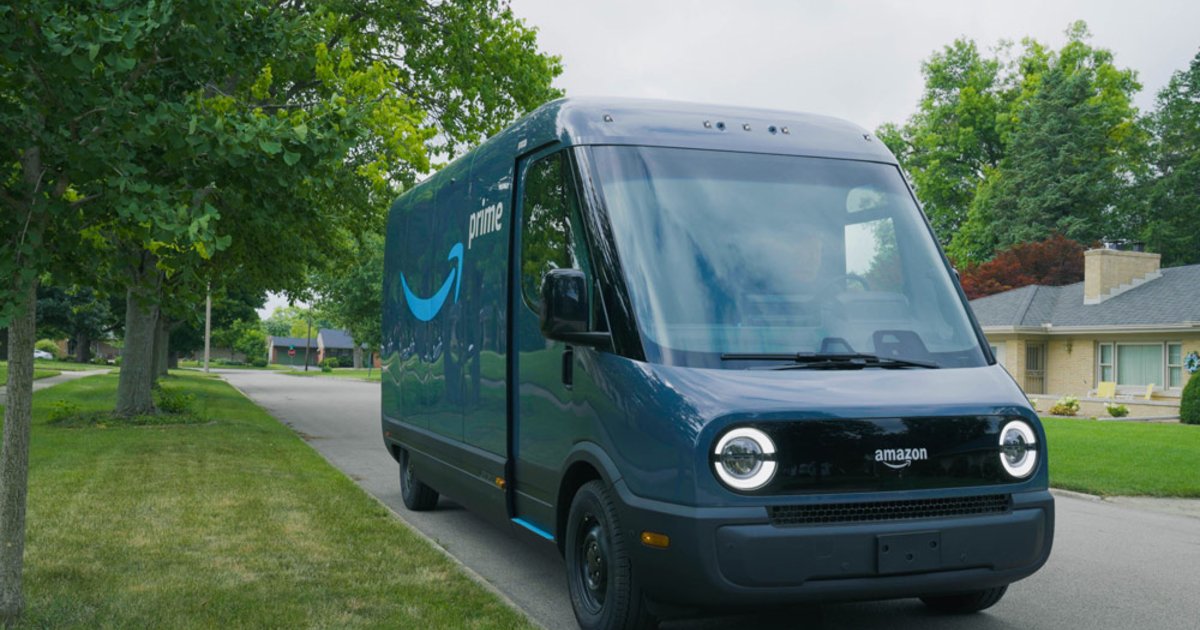
Rivian Automotive delivered its first batch of electric delivery vans on Thursday to Amazon, an early investor that has been waiting out production delays at the EV startup but can now put the futuristic vehicles to work in major U.S. cities.
“In 2019, Rivian and Amazon committed to fast-tracking a new type of delivery vehicle that would result in a significant reduction of carbon emissions,” Rivian CEO RJ Scaringe said in a joint statement by the companies. “That vision is now being realized.”
The move is another step forward for Rivian, which has struggled to ramp up production of its electric R1T pickup, and has only recently announced the formal launch of its R1S SUV. Rivian’s consumer vehicles are built on the R1 platform at its factory in Normal, Ill., and the electric delivery vans are built on a separate line.
Amazon unveiled road-ready EDVs at a last-mile delivery center in Chicago, the companies said. Amazon has been testing preproduction vehicles since last year.
“Starting today, customers across the U.S. will begin to see custom electric delivery vehicles from Rivian delivering their Amazon packages, with the electric vehicles hitting the road in Baltimore, Chicago, Dallas, Kansas City, Nashville, Phoenix, San Diego, Seattle and St. Louis, among other cities,” the companies said.
“This rollout is just the beginning of what is expected to be thousands of Amazon’s custom electric delivery vehicles in more than 100 cities by the end of this year — and 100,000 across the U.S. by 2030,” the release said.
The vans for Amazon’s fleet will come in different sizes, based on cargo capacity.
Rivian has said the EDV 700, with 700 cubic feet of cargo space, is rated at just more than 200 miles of range. The automaker is also making a smaller EDV 500, and plans a bigger EDV 900 — both with at least 150 miles of range.
Amazon said it has added thousands of charging stations at its delivery centers across the country and will continue the expansion to support the electrification of its delivery fleet. Amazon is also ordering electric Ram ProMaster vans from Stellantis.
Rivian said in its fourth-quarter 2021 earnings report that it had started production and deliveries of the electric delivery vans, and some test vehicles have been spotted in major cities.
“Amazon has been testing deliveries with Rivian preproduction vehicles since 2021, delivering over 430,000 packages and accumulating over 90,000 miles,” the companies said. “This significant testing has allowed Rivian to continuously improve the vehicle’s performance, safety and durability in various climates and geographies.”
The California-based automaker has struggled to ramp up production at its Illinois factory because of parts shortages, including semiconductor chips. First-quarter deliveries totaled just 1,227 vehicles, nearly all of them R1T pickups.
In March, Rivian filed a lawsuit against the maker of the EDV’s seats over pricing but said seat deliveries continued during the dispute.
Amid a relative trickle of R1T pickups and the lack of significant R1S or EDV deliveries, Rivian stock fell from more than $100 a share at the start of the year to a low of just more than $20 in mid-May. It has since recovered modestly and closed at $32.74 a share on Wednesday.
For the second quarter, Rivian significantly increased deliveries of the R1T and is now stepping up production of the R1S and electric delivery vans going into the second half of the year.
“Supply chain and production are ramping!” Scaringe wrote on Twitter this month. “We just announced production of 4,401 vehicles for Q2 bringing our cumulative total since start of production to 7,969 — keeping us on track to reach our year-end goals.”
Rivian does not break down production by model.
Amazon’s order for 100,000 vans by 2030 — with options for additional orders — is considered a significant driver of Rivian’s growth in coming years, in addition to the R1T and R1S.
Rivian expects to produce 25,000 vehicles this year out of the Illinois factory. The plant’s installed capacity is 150,000 vehicles per year.
Scaringe told Automotive News during a factory event in April that the factory could produce 50,000 vehicles this year if the automaker had enough parts.
Instead, Rivian is planning on some job cuts after growing rapidly, according to Bloomberg.
In a letter to employees last week, Scaringe acknowledged that the automaker is looking at cost cutting “in order to stay ahead of the changing economic landscape.”
“The hardest part of this process has been working through our organization to assess the size and structure of our teams and how well this aligns with our strategic plan,” Scaringe said in the letter, which Rivian shared with Automotive News.
“Our team is the core of Rivian and we are working to be as thoughtful as possible as we consider any reductions.
“We will always be focused on growth,” Scaringe wrote, “however, Rivian is not immune to the current economic circumstances and we need to make sure we can grow sustainably.”